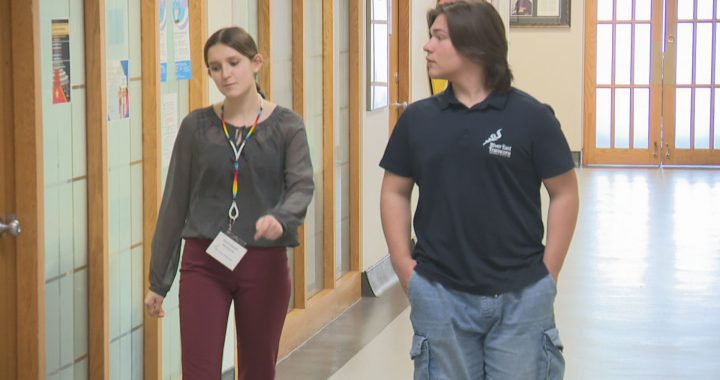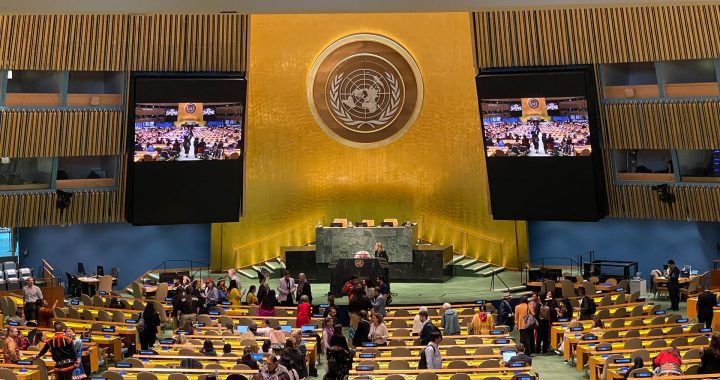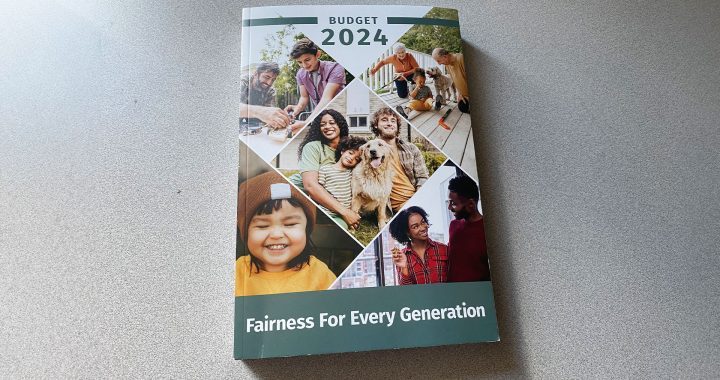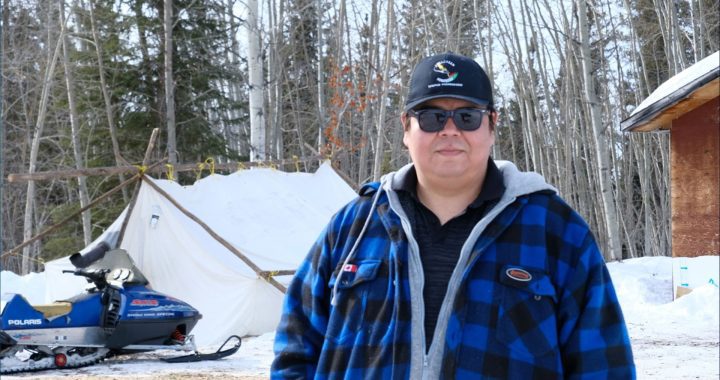Federal government ordered to hand over millions of residential school documents
The federal government has been ordered to hand over millions of documents to the Truth and Reconciliation Commission that is trying to determine the depth of the church-run Indian Residential schools that removed children from their families for more than a 100 years.
APTN National News
The federal government has been ordered to hand over millions of documents to the Truth and Reconciliation Commission that is trying to determine the depth of the church-run Indian Residential schools that removed children from their families for more than a 100 years.
Ontario Superior Court Justice Stephen Goudge ruled Wednesday the government is required to unearth the documents that the TRC has deemed relevant in order to fulfill its mandate.
The TRC is trying to prepare a historical record of the schools and produce a report when finished.
Goudge said the documents were needed to finish the report in a fixed timeframe and budget.
But federal government lawyers fought it saying the TRC was welcome to search files housed in Library and Archives Canada (LAC) in Ottawa.
Lawyers for the TRC said it’d take too long, plus they didn’t have the budget do that.
Now the government must make copies for them.
“All are inconsistent with excluding documents archived at LAC from Canadas obligation to provide relevant documents to and for the use of the TRC, compiled in an organized manner,” said Goudge in his decision. “None suggest that the TRC would be left on its own with LAC documents. This simply adds weight to the plain meaning of the words used, that Canada’s obligation to provide all relevant documents includes those housed at LAC.”
Aboriginal Affairs Minister John Duncan said in December he saw no “issue” in his government’s handling of residential school documents and blamed the head of the TRC for creating the controversy and slowing things down.
He made the comments at the Commons Aboriginal affairs committee and said the TRC would have all the documents by the summer.
“I fail to see the issue with their documents,” Duncan said. “Federally, I think we are in pretty good shape.”
Duncan placed the blame for the controversy at the feet of TRC Chair Murray Sinclair. Duncan said he’s received positive signals from Sinclair’s co-commissioners, Wilton Littlechild and Marie Wilson.
“It is only in Justice Sinclair that we are getting this kind of response,” said Duncan. “I don’t know what he is doing. I would like to think we can move on with the process.”
Sinclair said Wednesday the courts made the right decision.
“The TRC asked the Ontario Superior Court of Justice for clarification of its mandate as laid out in the Indian Residential Schools Settlement Agreement, and this is precisely what we have received today,” said Sinclair in a statement. “We’re grateful to be able to continue the Commission’s work of gathering and protecting for future generations documents that are relevant to the history of the Indian Residential Schools in Canada. We look forward to carrying out this work in cooperation with the Government of Canada. We especially acknowledge the clarity of Justice Goudge’s decision.”
Aboriginal Affairs deputy minister Michael Wernick, who also appeared before the committee, said the TRC would get all residential school records, including RCMP files. Wernick said the TRC would also get documents ranging up to the last existing school which shut down in 1996 and some documents around the conclusion of the multi-billion dollar residential school settlement.
Wernick said the TRC has already received over a million documents.
Wernick said the government, however, is drawing a line around documents from the negotiations leading to the court settlement and the private files of residential school survivors seeking compensation.
“We have a legitimate disagreement about the relevance of documents from the 2005 negotiations,” Wernick said. “We simply disagree they need to see all the applications and adjudications that are now under way.”
APTN National News was told in December that the TRC was seeking cabinet documents from the Paul Martin government years on the eventual residential school settlement.
The RCMP was involved in snatching children from their homes and forcing them to attend residential schools. The TRC believes the RCMP also has criminal complaints against residential schools and staff over abuse.
Assembly of First Nations chief Shawn Atleo called the court decision a victory.
“This decision is a significant victory, and we will continue to stand in support of former students of the Indian Residential Schools and First Nations as the historical record of the Indian Residential School system will now be more complete and available to future generations,” said Atleo in a statement. “Reconciliation is about achieving real change that must come from increased and improved understanding of our shared history. These documents are essential to the truth-telling and truth-sharing work of the TRC, and all of us.”
It’s believed more than 150,000 First Nation children were removed from their homes and placed in the schools that operated for nearly 150 years.










Thankfully the courts ordered the regime to hand over the documents.
1996 last one closed….that is shocking.
That’s so sad, I can’t imagine my babies being snatched from me
The wonders these documents will show and reveal.
Times were different then and parents were vulnerable to the clergy in the community, the Indian Agent, RCMP, the Hudson’s BAy Company, now known as North West Company who operate stores called Northern Stores and North Mart.
what i dont understand is why didnt parents fight back ??
they faced imprisonment back in the day, they had no choice in such matters.
If parents faught back they were arrested/shot/you name it. The kids were often tied up by the RCMP and brought by force to the schools. Choice was not part of the deal. Essencially the RCMO did exactly what the SS did in Germany during WW2.
Parents would try to hide their children if they heard that the police were there collecting them for school. If the children were found at home, parents would try to keep the police from taking them and be beaten black, blue and bloody (one such story I heard involved the husband being arrested and the wife being beaten so badly that neighbours had to care for the wife and 2 young children for 3 weeks while she recovered). Then, as Dennyz M said, they started imprisoning the men (primarily). Additionally, the Indian Agents who ran reservations would punish the families who resisted sending their children to school further by not approving the mens’ requests to hunt in order to provide for their family, withholding rations (food, clothes) and targeting their living areas for various destructive activities (ie destroying the garden plots they had planted by using them as training grounds for a horse) OR they would remove the children who were not school aged from the home and send them to be adopted by “an appropriate family” (by which they meant white folks).
Guess you didn’t read the part where they confirmed the RCMP was involved in the kidnappings…. How can you fight against the police when they are the ones that are supposed to be protecting you….
if you fought them they would kill you in front of the villagers n children as examples of trying to stop them…
There is a lot of information out there to explain it. Did you ask the question to make a staement against the parents and our people. Are you blaming the oppressed? Because if you want to know the truth, read books. All the information is there if anyone is interested
its real terrible the parents of those children didnt have rights to their children like other non native parents did. Its was the law children had to go or they were put in jail and if these parents had younger children they were taken away
yeah, its a valid question, one that many survivors often ask, too. many parents were threatened with denial of “rations” and would face extreme food shortages if they did not comply. others were told they would be put into jail. many, many parents did go to those schools and demand their childen only to be bet up, and jailed. many, many of those parents missed thier children so much and were unable to get them back, that they began to drink heavily to deal with their heavy hearts. my grandfather went, and he was not physically strong enough, and was only one man, to fight off the workers and priests at that school he struggled and got bet up. thankfully, my father as a boy, was very head strong, and very brave, he tried to escape many, many times, and would get his head shaved and be ridiculed for days by the nuns, priests, and staff afterwards. he kept speaking his language even though they threw him down in the isolated basement room called the “dungeon” for speaking it. due to his own volition, he did escape, found his parents and they all migrated to the united states. thanks for the question…i had wondered the same until i learned all of this from my family.